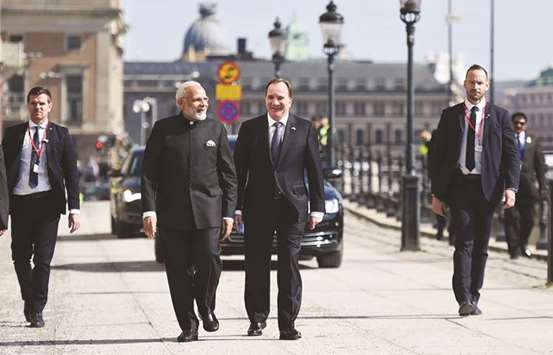India and Sweden agreed on yesterday to set up “a common task force on cybersecurity” and to work together to find innovative solutions for the environment, after leaders of the two countries met for talks in the Swedish capital Stockholm.
Narendra Modi was the first Indian prime minister to visit Sweden in 30 years, said Modi’s Swedish counterpart, Stefan Lofven.
In addition to discussions on enhancing defence and security co-operation, Lofven and Modi said they had also discussed investments in areas such as clean energy, digitisation and health.
Swedish defence firm Saab, which makes the JAS Gripen jet, is one of the companies hoping to compete for an order from the Indian Air Force.
The two countries also launched a partnership on environmental solutions.
Sweden was to make an initial contribution of 50mn kronor ($6mn Lofven said.
Lofven also noted India’s growing economy and the country’s importance in issues including climate change and sustainable development.
The two leaders did not take questions. Modi said Sweden and Swedish firms were important for the government’s Make in India policy, where investments that have a component of manufacturing in India get preference.
The topics were also brought up during a round-table discussion the two leaders attended with representatives from the business sector.
Modi said Sweden has been a strong contributor to the Make in India programme from the beginning and recalled that the Swedish prime minister himself led a big business delegation to the Make in India summit in Mumbai in 2016.
“The main theme of our discussions today was how to develop a win-win partnership between Sweden and India through the opportunities offered by India’s development programmes,” Modi said.
“As a result, we agreed to a Joint Action Plan and an Innovation Partnership.”
Stating that innovation, investment, start-ups, manufacturing were among the main areas of co-operation between the two countries, he said attention was also paid to renewable energy, urban transport and waste management to improve the quality of life of the Indian people.
According to the Joint Action Plan, both sides will initiate a multi-stake holder Innovation Partnership for a Sustainable Future, underpinning the mutual commitment to drive prosperity and growth and address societal challenges such as climate change and sustainable development through innovation.
The Action Plan also aims to exchange knowledge and explore co-operation on smart cities, including transit-oriented urban development, air pollution control, waste management, waste-to-energy, waste-water treatment, district cooling and circular economy, including through dialogue and capacity building.
The two sides also agreed to exchange know-how and explore co-operation in the areas of electro-mobility as well as renewable fuels.
The Joint Action Plan aims to deepen collaboration between the two countries in smart, sustainable and renewable energy, women’s skills development and empowerment, space and science, and health and life sciences.
“Defence and security is an important pillar of our bilateral relationship,” Modi said in his address to the media.
“Sweden has been partner of India in defence sector for a long time.
I am confident that new opportunities for co-operation in this sector will arise in the future, especially in defence production.”
Modi said that both sides also agreed to further strengthen security, especially cyber security co-operation.
According to the Joint Action Plan, both sides agreed to explore the finalisation of a bilateral agreement on exchange and mutual protection of classified information for co-operation in the defence area and encourage industry partners to develop supply chains for small and medium sized enterprises with major defence and aerospace original equipment manufacturers.

Prime Minister Narendra Modi takes a short walk with his Swedish counterpart Stefan Lofven from Sager House to Rosenbad, in Stockholm yesterday.
